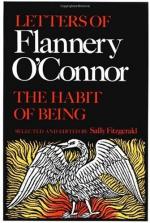|
This section contains 5,927 words (approx. 20 pages at 300 words per page) |

|
SOURCE: Oliver, Bill. “Flannery O'Connor Compassion.” Flannery O'Connor Bulletin 15 (1986): 1-15.
In the following essay, Oliver analyzes O'Connor's unique sense of compassion in “A Temple of the Holy Ghost,” “The Artificial Nigger,” “Parker's Back,” and “Judgment Day.”
Compassion is the quality O'Connor's fiction is supposed to lack. John Hawkes, in an early and still influential essay, said that her characters “are judged, victimized, made to appear only as absurd entities of flesh” (399). Jesse Hill Ford suspected that she hated human kind. “Her fiction,” he said, “has an axe-murder feel to it” (Martin 216). More recently, the French critic André Bleikasten asserts that between O'Connor and her characters “lies all the distance of contempt, disgust, and derision” (56). Not even O'Connor's many apologists make great claims for her tenderness; by emphasizing her role as an embattled Christian calling for repentance in the wilderness of American secularism, they imply that she could not...
|
This section contains 5,927 words (approx. 20 pages at 300 words per page) |

|


